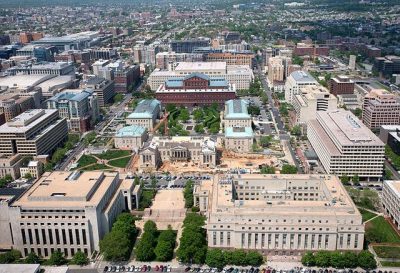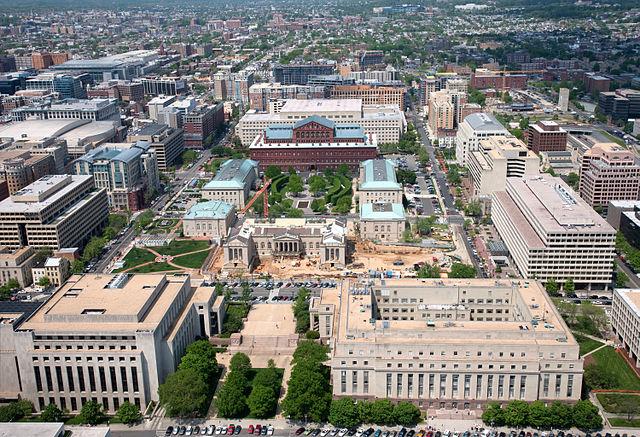
Aerial View of Washington, DC
It’s not usually realistic for a candidate who came in 5th to credibly claim that he had a major impact on an election.
Yet Andy Shallal did.
When he launched his late-starting, outsider campaign for Mayor of Washington, D.C., local political conversations were about a booming city with a scandal-plagued incumbent mayor. By the end, all the discussions were about which candidate had the best chance to defeat the scandal-plagued mayor.
But for a few months at least, Shallal injected the “Tale of Two Cities” reality into the local narrative, tying it explicitly to race and class. He argued against just counting construction cranes, in favor of counting how many kids remain in deep poverty, how many African-Americans remain unemployed, and how much it costs to afford a home.
By the end of the campaign, all the candidates, including four sitting city council members, were promising (however vaguely) that they would focus on affordable housing, and finding ways to keep long-time residents in their homes.
Was this all due to Shallal’s candidacy? No.
Was the election debate more serious and more explicitly tied to race and class because he was running? Absolutely.
Consider the issue of education reform, where Andy had a profound impact. Before his candidacy, almost the entire political establishment inside the Beltway, from the Washington Post to the City Council to the Mayor to the Secretary of Education to the President, all seemed to agree that education “reform” in Washington, D.C., was a huge success: test scores were up, and “Race to the Top” was working.
Andy Shallal disagreed. And he did so by pointing out some stubborn facts.
He pointed out that the racial gap had increased, not decreased, since so-called “reform” had been put in place. He pointed out that a big chunk of the test score gains over time came before the so-called “Rhee reforms,” before the closing of so many neighborhood schools, before the churn and turmoil caused by the firing of hundreds of supposedly “bad” teachers.
His campaign website opened up to a graph that showed that the 8th-grade reading scores for low-income students were lowest among all major urban areas. He pointed out that “no child left behind” had turned into “no child left untested, no teacher left unstressed!” He promised there would be no more neighborhood school closures.
Shallal didn’t just complain. He called for reclaiming the promise of public education, and published a 13-page white paper which led Diane Ravitch to write—under the blog heading A Mayoral Candidate for D.C. Who Rejects the Rhee Era of Test and Punish: “…it is heartening to know that at least one of the mayoral candidates has a fresh vision for educating the children of the District of Columbia and is willing to oppose the status quo.”
By the end of the campaign, closing the education racial gap was a top issue for everyone. Andy had punctured the false consensus about the “success” of education “reform.” A bit of truth had seeped through all the hype.
Andy Shallal did not win. He will not — unfortunately, in my opinion — be D.C.’s next mayor. He could not overcome being unknown to most voters, running as an Iraqi-American in a city often divided between Whites & Blacks, and getting a late start.
He was outstanding in the debates and forums, but “only” raised a couple hundred thousand dollars, which meant his direct voter contact lagged far behind most other candidates.
Andy called for public financing, but unlike in New York City, where Bill de Blasio’s brilliant run for mayor was boosted by the city’s 6-1 public match for small donations, there is not such a system in Washington—and he was outspent by something like 7-1.
So he lost the race.
But he made a difference. He changed the way D.C. talked about its growth, its inequality, its own “tale of two cities.” He altered the propaganda that has surrounded Washington, D.C.’s school “reforms,” and brought the racial gap back into focus.
He took on the hardships of running, and faced up to defeat with dignity and good humor—and he made a difference on several issues that matter to the poorest, most disrespected, most disenfranchised people in D.C.
In a money-drenched political system that often requires multiple candidacies prior to winning, Andy Shallal sowed some seeds for the future.
